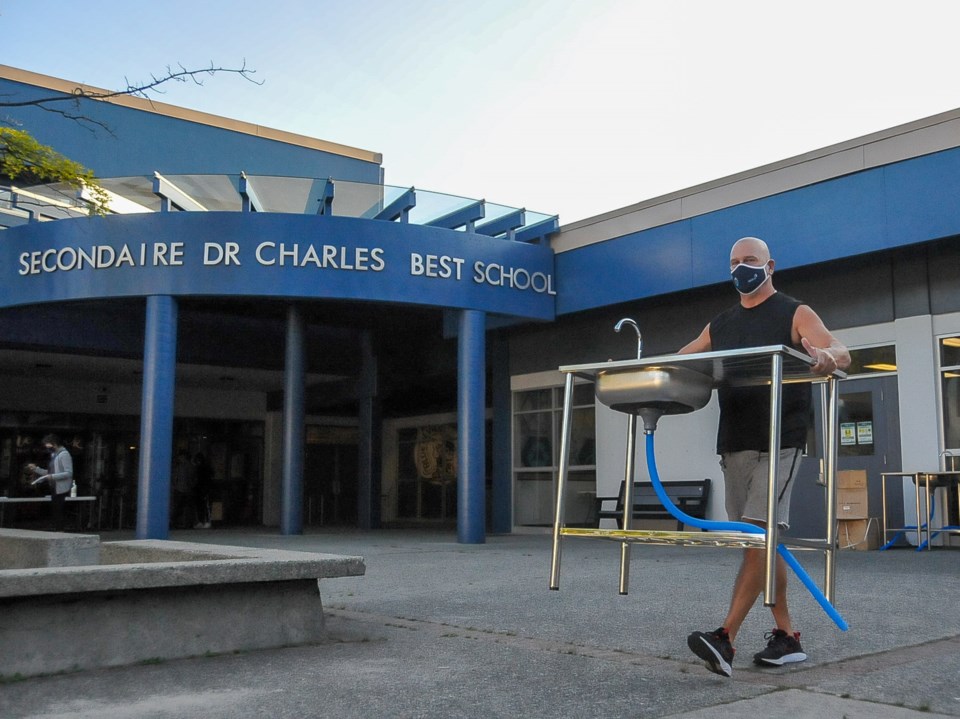With less than a month until schools reopen, a coalition of doctors, nurses, health scientists and advocates for pupils and teachers is warning the NDP government about a repeat of the so-called “tripledemic.”
“In short, we are on track for a rinse-and-repeat of last year,” Protect Our Province B.C. (PoP BC) said in a Tuesday open letter to Premier David Eby, Health Minister Adrian Dix and Education Minister Rachna Singh.
Last August, PoP BC sounded the alarm about a coming triple whammy of influenza, respiratory syncytial virus (RSV) and another COVID-19 wave. Eventually, six children in the province died and emergency rooms were jammed throughout winter.
“Currently in B.C., we have no mask protections in schools, no proof of indoor air quality in schools including monitoring of carbon dioxide levels during full class occupancy, no [high-efficiency particulate air] filtration units available in most classrooms, almost non-existent [nucleic acid] testing, and only the occasional provincial public health report (and those reports we do see are of limited value),” the open letter said.
PoP BC said it fears parents will send infected children to school and make things worse, leading to mass-absenteeism and another round of emergency room delays. They point to a new “summer wave” of COVID-19 in parts of the U.S., new variants spreading in Japan and the U.K., as well as a bellwether rise in respiratory illness during the southern hemisphere’s winter.
PoP BC proposed a five-point plan: Improved ventilation and air cleaning; a return of mask mandates in schools; admitting COVID-19 is airborne and can hang in the air for hours, like cigarette smoke; dipping into the federal stockpile of 39 million rapid antigen tests and distributing them widely; and early vaccination of children and families against COVID-19.
“You as leaders have a choice: Either do nothing or decide to protect B.C. children, their educators and their families. Schools are not islands. Viruses walk in and then viruses walk out to infect families and communities. Studies show that schools are still the major source for COVID-19 transmission with 70 per cent of COVID-19 infections transmitted to households from children,” stated the report. (In a U.S. study of more than 166,000 households with adults and children, of the households that had a transmission over a three-year period, 70.4 per cent of those transmissions were deemed to have started with children.)
New versions of the Pfizer and Moderna vaccines await federal approval and could be ready by the end of September.
More than a year and a half ago, the B.C. government’s management of the pandemic pivoted to a hybrid immunity theory, one that relied on a combination of high vaccination rates and mass-infections of less-lethal mutations of the virus. In April, when the B.C. government discontinued updating its COVID-19 dashboard every weekday, it had counted almost 400,000 confirmed cases and 5,430 deaths since the pandemic began in early 2020.
More than 50 signatories to the open letter include the Safe Schools Coalition B.C., B.C. School Covid Tracker, Do No Harm B.C., Vancouver District Parent Advisory Council’s health and safety committee and the Canadian Aerosol Transmission Coalition.
PoP BC co-founder Lyne Filiatrault is a retired emergency room doctor who, in March 2003, helped identify and contain the first case of Severe Acute Respiratory Syndrome (SARS) at Vancouver General Hospital in a patient who had returned from Hong Kong.
The 2007 report of Ontario’s SARS judicial public inquiry credited “robust worker safety and infection control culture, with better systemic preparedness” in B.C. and urged public health to adopt a precautionary principle across the system.
“Safety comes first,” concluded the final report. “That reasonable efforts to reduce risk need not await scientific proof.”




